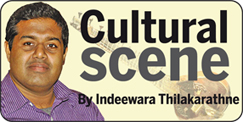Galle Literary Festival and politics of literature

In this week’s column, I would like to explore one of the thought
provoking sessions of the Galle Literary Festival entitled Aftershocks,
the lingering legacy of civil war and the ‘after shocks’ of the session
and the perennial issue of politics of literature.
The much –published session was moderated by Bridget Kendal and was
broad cast over BBC. Sunili Abeysekara; Nigerian writer, Chimamada Ngozi
Adichie; and Anjali Watson were featured in the session.
The description of the session on the GLF programme read: “Sunila
Abeysekara explores the challenges the Sri Lanka continues to face
almost two years after the end of the civil war; Chimamada Ngozi Adichie
portrays the lasting efforts of Nigeria’s 1960’s civil war in her short
story collection, The things around your neck, Anjali Watson looks at
post-war Sri Lanka from the perspective of wildlife animals and suggest
that perhaps, war was better for them.”
Before tackling some of the issues discussed or touched during the
session, it is pertinent to look, at least, briefly, now non existing
country called Biafra. It was a region of Nigeria inhabited mainly by
the Igbo people and existed from 30 May 1967 to 15 January 1970. The
secession was led by the Igbo people due to economic, ethnic, cultural
and religious tensions and to safeguard a prosperous region from
Nigeria. However, the civil war in Biafra claimed over one million lives
leading to the collapse of Biafra and reintegration of the territory
into Nigeria in 1970.
Intersection of politics and literature
Although the session was supposed to be a part of literary festival,
the opinions and views expressed by both Sunila Abeysekara and Angali
Watson seemed to be little or nothing to do with literature. Sunila
Abeysekara was introduced as a human rights activist who had worked with
displaced persons (Internally Displaced Persons). The crust of Sunila’s
arguments was lack of access to IDPs. She said that she is concerned
about ‘psychological and emotional peace’ of IDPs. Anjali Watson was
described as one of the founders of ‘Wilderness and Wildlife
Conservation Trust’ which she founded with her husband. Her basic
concern was the co-existence between wildlife and human habitat.
Chimamada read out an extract from her short story entitled “A
Private Experience”. “Even without the woman’s strong Housa accent,
Chika can tell she is a Northerner, from the narrowness of her face,
unfamiliar rise of her cheek bones; and that she is a Muslim, because of
the scarf. It hangs around the woman’s neck now, but it was probably
wound loosely round her face before, covering her ears.
A long flimsy and black scarf with garish prettiness of cheap things.
Chika wonders if the woman is looking at her as well, if the woman can
tell, from her light complexion and the silver finger rosary her mother
insisted she wear, that she is Igbo Christians with machetes, clubbing
them with stones. But now she says, “Thank you for calling me.
Everything happened so fast and everybody ran and I was suddenly alone
and didn’t know what I was doing…
Chimamada pointed out that one’s the ethnicity becomes an issue, it
would be politicised combining with religion. She quoted a passage to
highlight the point:
“Chika wonders if that is all the woman thinks of the riots, if that
is all she sees them as –evil. She wishes Nnedi were here. She imagines
the coca brown of Nnedi’s eyes lighting up, her lips moving quickly,
explaining that riots do not happened in a vacuum, that religion and
ethnicity are often politicised because the ruler is safe if the hungry
ruled are killing one another…” (A Private Experience, p.48)
Apart from the politics of literature and human rights, the session
provided an insight into how literature could intermingle with politics.
The session also emphasised how literature could be a medium to discuss
things which are not be able to discuss in non-fiction. The
well-researched collection of short stories The Thing Around Your Neck
by Chimamada Ngozi Adichie is an object lesson, particularly for
contemporary Sri Lankan writers in English.
It is pity that after a decades of conflict and when the ambers of
the fire which consumed a large number of Sri Lankans’ lives on the both
sides of the divide wafting off , a substantial canon of literature on
conflict and issues associated with civil war both in North and East and
in the South is yet to emerge.
I wonder whether the organisers of the GLF were aware of the Sri
Lankan bilingual author, Sita Kulatunga who wrote Dari, the third wife,
an elegantly crafted novel based on Nigeria. Kulatunga’s novel is a fine
monologue of a woman who is plunged into a marriage at very young age
partially due to her customs of the homeland and partly due to her
poverty. Dari becomes the third wife of rich Alhaji Bello who is tired
of his two marriages before.
If Chimanda’s collection of Short stories The Things Around Your Neck
codifies the turbulent socio-economic life during and in the aftermath
of Biafra war in Nigeria, Sita Kulatunga’s Dari, the third wife depicts
the institution of family and a story of polygamous marriages in Nigeria
through the eyes of a very talented Sri Lankan author.
It is a mystery how the GLF organisers selected Sri Lankan authors,
particularly their criteria! The grim reality of the literary quality
and content of the literary work of Sri Lankan authors featured in the
festival is that they are extremely poor both in terms of content and
craft.
In essence, those below-mediocre writers and their ‘literary work’
could not represent Sri Lankan literature in English or Sinhalese, but
indeed the current crisis in the contemporary Sri Lankan literature.
|

